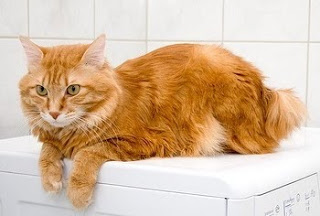Kurilian Bobtail History
The Kurilian Bobtail is a natural breed that existed in isolation for approximately 100 to 150 years on the Kuril Islands, a volcanic chain of islands strung between Russia and Japan. All of these islands are under the Russian jurisdiction, although the southernmost four are claimed by Japan as part of their territory. However they are mostly uninhabited.
There are several Russian documents referring to cats with a short tail, which were brought home from the islands by the members of the military or scientists in the middle of the 20th century. The character of these cats made them very popular, however the lack of a Russian cat club delayed their being registered and consequently promoted as a pedigreed cat.
Besides, most people considered that the Kurilian was just a Japanese Bobtail of heavier type. Even today, it cannot be said that the Kurilian Bobtails and the Japanese Bobtails have an entirely different genetic background. In fact, it is probable that the Kurilian Bobtail was the original source of mutation for the short tail in the Japanese Bobtail. The difference is that the Japanese Bobtail is a non-natural breed with a similar tail.
Actually, the Kurilian are cats of the wild type with a wild origin. Russian Breeders have kept this distinction in the Kurilian, while others have created the elegant Japanese Bobtail.
The Kurilian Bobtail cats were first shown in 1991. This led the Soviet Felenology Federation to adopt the first breed standard. The breed was officially recognized by the World Cat Federation in 1995 and by the Fédération Internationale Féline in 2004.
Kurilian Bobtail cat Personality
Kurilian Bobtail cats are blessed with a very well-balanced character. Their wild look is not reflected in their temperament, since they possess a serene nature and require a lot of cuddling and caressing. Friendly and sociable, they are devoted to their human family and when allowed are either on the lap of or sleeping in bed with them. They get on well with other cats, children, dogs or other household pets. They are also gentle and adapt well in the apartment life.
In addition, Kurilian Bobtail cats are highly intelligent, inquisitive and clever cats. They seem to understand everything their owner desires and are easy to train to respond to voice command alone.
Besides, they are inoffensive and curious, not only towards people but also other animals. Being excellent jumpers and are inclined to survey their domain from the highest point available to them.
Furthermore, the Kurilian Bobtail cats are notorious for their fishing abilities. They are excellent swimmers and love to play in a bathtub with a dripping tap. They have also developed great hunting skills, especially towards rats and flies.
Kurilian Bobtail Breed Standards
According to the Fédération Internationale Féline, the Kurilian Bobtail cats possess a large, trapezium shaped head, with rounded contours. The head is wide at the cheekbone level and slightly rounded in profile. Their chin is well developed and wide and their nose is medium, long and straight. The nose bears a gentle dip from the forehead to the broad, without a definite stop.
The ears are medium sized, wide at the base and slightly pricked forward. Their tips are rounded and their base is open. They bear lynx-like tufts and long hair out of the ears. The ears are set wide apart and medium height, while the distance between them is equal to the width of their base.
The eyes are oval on top and round at their base, set wide apart and slightly slanted. All eye color varieties, from yellow to green are allowed, except for the white Kurilian Bobtail cats and those with coat patterns that bear white that may only possess blue or odd eyes.
Their body has a compact structure, with well developed musculature and solid bones.
Their back shows a delicate curve from the shoulders to the rump, with the rump being higher.
Their legs are medium in length, strong and sturdy, with rounded paws. Note that the hind legs are longer than the forelegs.
As for the tail, this is composed of one or more angles or curves or any combination. The result is that of the pom pom look. The direction of the curves is of minor importance. The tail may be rigid or flexible, while its visible length without the coat varies from 3 to 8 cm (1.5 - 3.5 inches). It is important though that the size and shape of the tail harmonizes with the overall appearance of the cat.
The coat should short for the Shorthair variety and semi-long for the longhair variety. The texture of the Shorthair cat coat should be soft and silky, laying flat. It should possess a moderate undercoat and be resilient without a plush dense feel. As for the Longhair's coat texture, this should be fine and silky, laying flat with a moderate undercoat.
All coat color varieties are allowed with the exception of colorpoints, chocolate, cinnamon, fawn, lilac and the same combined with white. However, any amount of white is allowed, i.e. a white blaze, white locket, white chest, white on the belly, white on the paws, etc.
More specifically, the recognized color varieties are the following:
· White
· Black/Blue/Red/Cream
· Black/ Blue tortie
· Black/Blue/Red/Cream/Black tortie/Blue tortie smoke
· Black/Blue/Red/Cream/Black tortie/Blue tortie agouti
· Black/Blue/Red/Cream/Black tortie/Blue tortie silver/golden agouti
· Black/Blue/Red/Cream/Black tortie/Blue tortie with white
· Black/Blue/Red/Cream/Black tortie/Blue tortie smoke with white
· Black/Blue/Red/Cream/Black tortie/Blue tortie agouti with white
· Black/Blue/Red/Cream/Black tortie/Blue tortie silver/ Golden with white

